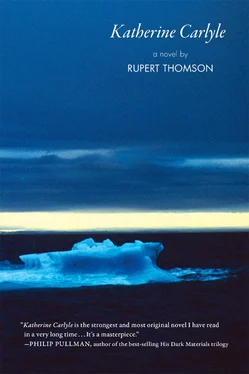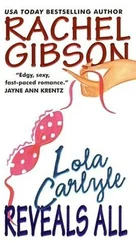“He’s crazy about that team,” she says. “I think maybe he loves it more than me.”
She introduces me to Svetlana, who is in her twenties. Svet teaches the children. She has limp blond hair and sits with her hands wedged between her thighs. Her purple sweater has a white reindeer on the front. I try out a few of my Russian phrases but all she does is nod or shake her head. Zhenya tells me she is very shy. Most of the other guests are in their thirties or forties and none of them speak English. Zhenya’s husband, Gleb, sits on the sofa drinking beer with two other men.
For dinner we move to the table. Once we have finished the main course — pork escalopes and potatoes in a sour cream sauce — Zhenya leaves the room. The lights go out and she returns with a cake, her face made golden by the candles. She stops in front of me. The white icing has been sculpted to resemble the landscape that surrounds the town, while the buildings are huddled blocks of yellow, brown, and green. People sing “Happy Birthday” in Russian and when they come to the end I blow the candles out. Loud applause, and a piercing whistle from one of Gleb’s friends.
The lights flicker on. I get to my feet.
“Thank you, Zhenya,” I say in Russian. “Thank you for this beautiful” — I can’t remember the word for cake — “this beautiful pastry.” Everybody laughs. “I’m very happy. This town is like a home to me.” I say thank you again and sit back down.
Later, vodka is served, and the guests sing traditional folk songs from Russia and Ukraine, one of which — “Kalinka” — they insist I learn.
“Your Russian is very good,” Gleb says, the first words he has addressed to me all evening.
Everyone dances, even Svet.
It’s the strangest birthday I have ever had.
/
The next day I wake at seven, and though my head aches from all the vodka I pack a bag and walk over to the pool. Ever since Anatoly gave me my certificate of health I have been meaning to start swimming, and this seems as good a time as any.
A still morning, the air like aluminium. Snow crunching and wincing beneath my feet. I pass a lighted ground-floor window. A woman in a green sweater stands at a kitchen sink. Her hair hangs past her shoulders, straight and brown. She appears to be looking at me but her face doesn’t alter and I realize I’m invisible to her. All she can see is her own reflection — though if I had to guess I would say her mind is somewhere else, a past she misses, a future she’s hoping for. Feeling I’m intruding, I move on. On reaching the square, I tilt my head back. Breathe in deeply. Whole galaxies scattered across the sky, like cocaine on a smoked-glass table. The life I used to live in Rome seems overblown, preposterous. Made up.
I cross a red entrance hall that is empty apart from a wooden bench and a well-stocked trophy cabinet. The TV is showing a wildlife program, but no one’s watching. As I hand my certificate to the woman in the office I think of Anatoly, who left without saying goodbye. Was he angry with me? Did he feel rejected? Or am I overestimating my own importance? Probably he knew most of the people who lived in town, and he would have had a lot on his mind, as you do when you’re moving. The last time I saw him, at breakfast, he told me he collected coins. I ran up to my room and came down with some loose change left over from Berlin. As he took the money his fingers touched mine and he looked me full in the face, then he lowered his eyes and turned the coins over on his palm. Beautiful , he said.
The woman mutters what sounds like a caution, but I don’t understand the words. Only when I leave the changing room do I notice there is no one in the pool. There’s no lifeguard either. I walk to the deep end. The water is murky, almost brown, like the bathwater in the hotel, and I remember Anatoly telling me it’s piped in directly from the fjord, and that I should be careful not to swallow it. Perhaps the woman was saying that if I get into trouble it will be my own responsibility.
I haven’t swum since the end of August and I reel off half a dozen lengths of languid freestyle, feeling the chill on my skin. Then, when my muscles have loosened, I switch to breaststroke. The musty muddy flavor of the water isn’t entirely pleasant but I gradually get used to it.
After thirty laps my body finds a familiar rhythm. I started swimming laps the year my mother died. It was a way of not talking. Not thinking. Some of my wealthier friends had pools in their gardens — one even had a rooftop pool that overlooked the Colosseum — but I preferred the high hollow echo of a sports complex like Belle Arti, where I could swim unobserved, among strangers, or the Piscina delle Rose, open to the Roman sky, and surrounded by surreal neoclassical buildings and bursts of purple bougainvillea. I was soothed by the going back and forth, from one end to the other. All that repetition. It was like crossing something out. It was like forgetting. By the time summer drew to a close I could swim for an hour without stopping. When I finally hauled myself out of the water after one of those sessions I would feel exhausted and relaxed and curiously unformed, half muscle, half liquid. I spent so much time in the pool that my body began to change, my shoulders widening, my limbs longer and more toned.
Once in a while I notice things — a row of rust-red radiators, three reindeer picked out in dark tiles on the wall above — but mostly my mind floats free. Then something alters, and I have the sudden conviction that somebody else is in the pool. When I turn at the deep end and peer ahead of me there’s no one there, just a wide, shifting box of green-brown water. I struggle to explain the rush of apprehension and euphoria. As I keep swimming back and forth, the sense that I’m not alone intensifies, becomes specific. There are people on either side of me, and slightly behind me, just out of range of my field of vision. Turning at the shallow end, I look left and right. The pool is empty. But as I swim back towards the deep end I have the feeling once again that I’m accompanied. We’re in a loose V shape, like geese flying south for the winter. A shiver ripples through me. I’m remembering a conversation with Aunt Lottie, in her house in Norfolk. This was a few days after my father took me to the restaurant in Kensington. We sat in armchairs by the fire, with cups of tea nearby. You weren’t alone when they put you inside your mother’s womb , Lottie said. There were three of you. Three of me? I didn’t understand. Three embryos , Lottie said. I know. I was there . Outside, the wind hurled itself at a row of conifers. On the ultrasound you showed up as small specks floating side by side. Something so brave about it — like spaceships launched into a huge, uncertain universe . She prodded the logs with a poker, and the chimney sucked up all the sparks. Your mother was worried none of you would make it. Because that was what happened before, more than once, and it nearly destroyed her. You were the last throw of the dice . Lottie reached for my hand and squeezed it, her eyes wide open, almost scared. You know what she told me later, after you were born? She told me she was amazed by you. Why? I said. Why was she amazed? You were the strong one, the charmed one . Lottie’s eyes found mine, flames leaping in her pupils. You were the one who wanted to live .
After forty-five minutes my body begins to tire. I should build up slowly. Not overdo it. As I climb out of the pool I glimpse something in the corner of my eye, a shadowy scissor movement that might be someone’s legs, a person walking quickly, but when I stand dripping on the tiled edge and look around, there’s no one there. I think of the thawed embryos implanted at the same time as me. I imagine them looking for stability, security, and failing to connect, their cells degrading, their gorgeous yellow darkening to a grim doomed black. How to remember them? They had no names, no faces. There were no funerals, no graves. No ashes to be taken by the wind or washed away by rain. They left nothing in the minds of those from whom they came, nothing except — what? The memory of those white grains in the pulsing gloom, and a sense of regret, as indescribable as the taste of water.
Читать дальше












